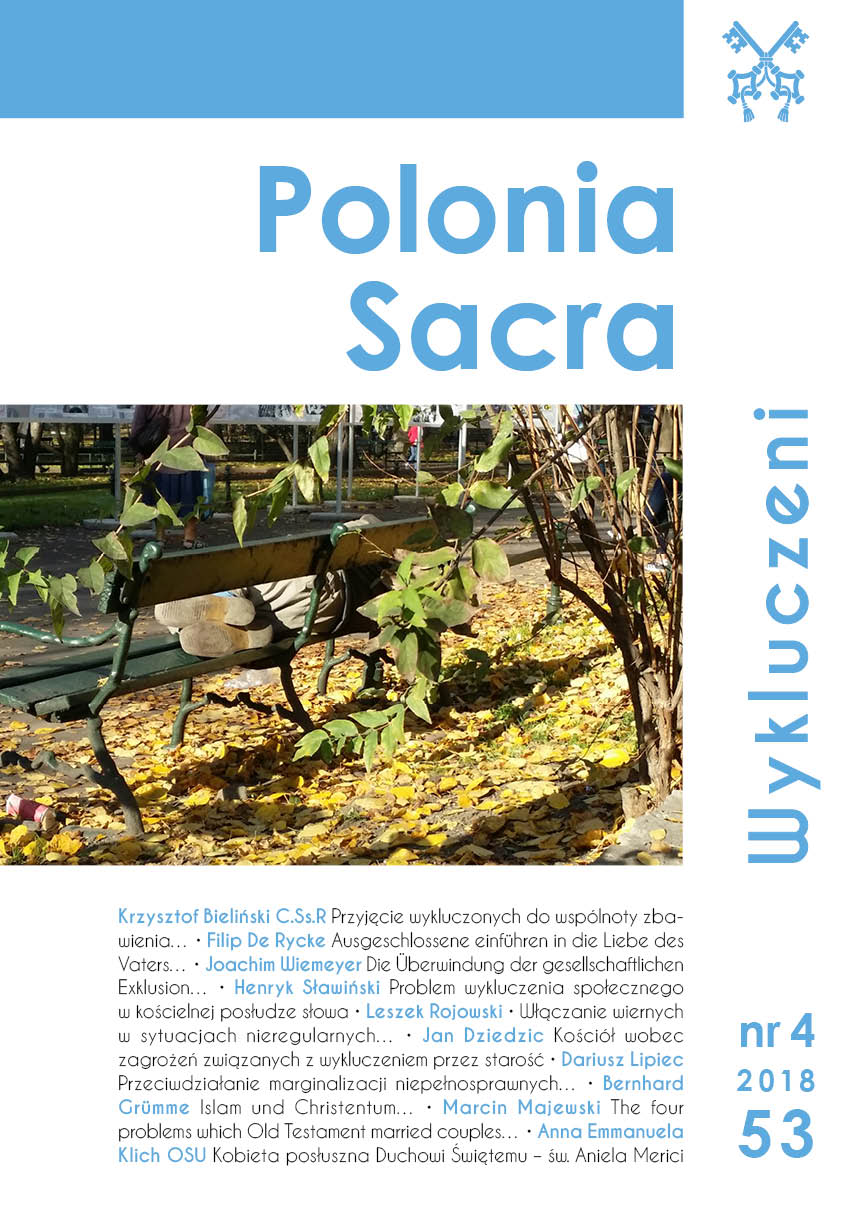Przyjęcie wykluczonych do wspólnoty zbawienia na przykładzie Dz 15, 1–35
DOI:
https://doi.org/10.15633/ps.2628Słowa kluczowe:
wykluczeni, sobór w Jerozolimie, uniwersalizm zbawczy, synodalnośćAbstrakt
Celem artykułu było ukazanie sposobu postępowania wspólnoty pierwotnego Kościoła wobec problemu przyjęcia do wspólnoty zbawienia wykluczonych wcześniej pogan. Kwestia ta stanowiła wielkie wyzwanie teologiczne, pastoralne i normatywno-dyscyplinarne dla chrześcijaństwa początków. Zagadnienie przedstawione zostało w trzech punktach. Z uwagi na fakt, iż przedmiotem rozważań był eklezjalny proces decyzyjny dotyczący norm postępowania, w punkcie pierwszym zdefiniowane zostało pojęcie decyzji moralnej w jej trójwymiarowości czasowej. Stwierdziliśmy, że rozpoznanie prawdy moralnej jest owocem spotkania między przeznaczeniem (ἔσχατος), zbawczym działaniem Chrystusa (κριτήριον) oraz rzeczywistością wymagającą przemiany (καιρός). W centralnym, drugim punkcie ukazano paradygmat procesu eklezjalnej decyzji, którego owocem było pełne włączenie do wspólnoty Kościoła wykluczonych etnochrześcijan. Kościół czasu soboru w Jerozolimie na „sposób synodalny” podjął problem wykluczonych i rozwiązał go w wyważonym połączeniu prawdy, wolności i miłości, stając się pod tym względem koniecznym punktem odniesienia dla procesu rozeznawania wspólnoty chrześcijan każdego czasu. Przypomniano o tym w trzecim punkcie artykułu, który dedykowany został aktualnym wskazaniom na temat rozeznawania wspólnotowego zawartym w dokumencie Biblia a moralność. Wskazano w nim, iż Pismo Święte, niezbędne źródło inspiracji dla procesu rozeznawania eklezjalnego, nadal stanowić powinno konieczny punkt odniesienia dla rozwiązywania przez Kościół nowych, aktualnych problemów etycznych. Celem najważniejszym, który udało się osiągnąć, było zaproponowanie synodalności, starożytnej kościelnej metody rozeznawania, chrześcijańskiej „kultury dialogu i spotkania” jako skutecznej metody przezwyciężania degradującej współczesną cywilizację „kultury wykluczenia”.
Bibliografia
Barbaglio G., Conflittualità e riconciliazione nelle prime comunità cristiane, w: G. Barbaglio, Emozioni e sentimenti di Gesù, Bologna 2009, s. 199–210.
Fabris R., Atti degli Apostoli, Brescia 62004.
Gnilka J., Pierwsi chrześcijanie. Źródła i początki Kościoła, Kraków 2004.
Gnilka J., Teologia Nowego Testamentu, Kraków 2002.
Lausberg H., Retoryka literacka. Podstawy wiedzy o literaturze, tłum. A. Gorzkowski, Bydgoszcz 2002.
Maceri F., La coscienza morale filiale, w: Figli nel Figlio. Una teologia morale fondamentale, a cura di R. Tremblay, S. Zamboni, Bologna 22016, s. 225–248.
Marconcini B., Verità e carità al concilio di Gerusalemme (At 15, 1–35), w: Atti degli Apostoli, a cura di M. Crimella, Padova 2013, s. 218–225.
Marguerat D., Steffek E., L’avvento della salvezza universale in Luca–Atti, w: Una salvezza a misura dell’universo. Scritti in onore di Gérard Rossè, a cura di G. Ibba, Roma 2015, s. 139–162.
Marguerat D., Gli Atti degli Apostoli. 2 (13–28), Bologna 2015.
Martini C. M., Il decreto del concilio di Gerusalemme, w: Fondamenti biblici della teologia morale. Atti della XXII Settimana biblica (della) Associazione Biblica Italiana, Brescia 1973, s. 345–355.
Papieska Komisja Biblijna, Biblia a moralność. Biblijne korzenie postępowania chrześcijańskiego, Kielce 2009.
Pindel R., Mowy obronne św. Pawła w Dziejach Apostolskich. Analiza retoryczna Dz 24 i 26 w kontekście zastosowania retoryki w biblistyce, Kraków 2012.
Rakocy W., „Będziecie moimi świadkami…” (Dz 1, 8). Dzieje Apostolskie, w: Wprowadzenie w myśl i wezwanie ksiąg biblijnych. 9. Dzieje Apostolskie. Listy św. Pawła, red. J. Frankowski, S. Mędala, Warszawa 1997, s. 13–81.
Rakocy W., Tak zwany Sobór Jerozolimski wyrazem troski o jedność pierwotnego Kościoła, „Roczniki Teologiczne” 43 (1996) z. 1, s. 139–148.
Rossé G., Atti degli Apostoli commento esegetico e teologico, Roma 1998.
Szymik S., Mowy w Dziejach Apostolskich, w: Encyklopedia katolicka, t. 13, red. E. Gigilewicz, Lublin 2009, kol. 377–378.
Vidal M., Manuale di etica teologica.1. Morale fondamentale, Assisi 1994.
Pobrania
Opublikowane
Numer
Dział
Licencja
Autorzy publikujący w czasopiśmie udzielają jego wydawcy zgody o następującej treści:
- Autor zachowuje autorskie prawa majątkowe do utworu, a jednocześnie udziela wydawcy czasopisma zgody na jego pierwszą publikację w wersji drukowanej i wersji online na licencji Creative Commons Uznanie autorstwa 4.0 Międzynarodowe oraz zgody na wykonywanie opracowań, w tym przekładów.
- Autor ma możliwość udzielania zgody niewyłącznej na opublikowanie utworu w wersji, która ukazała się w czasopiśmie (np. zamieszczenia go w repozytorium instytucjonalnym lub opublikowania w książce), wraz z informacją o jego pierwszej publikacji w czasopiśmie.
- Autor może umieścić swój utwór online (np. w repozytorium instytucjonalnym lub na swojej stronie internetowej) jeszcze przed zgłoszeniem utworu do czasopisma.

